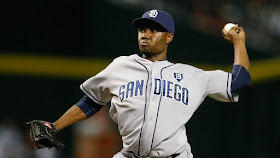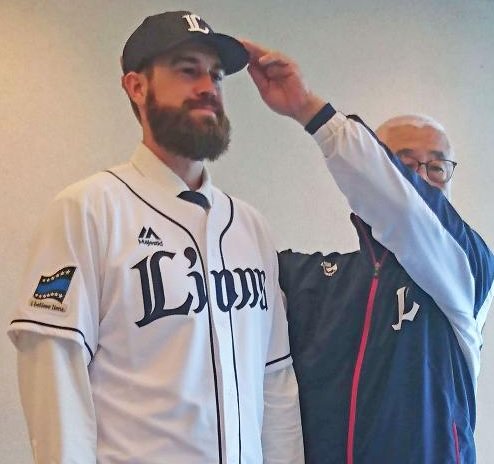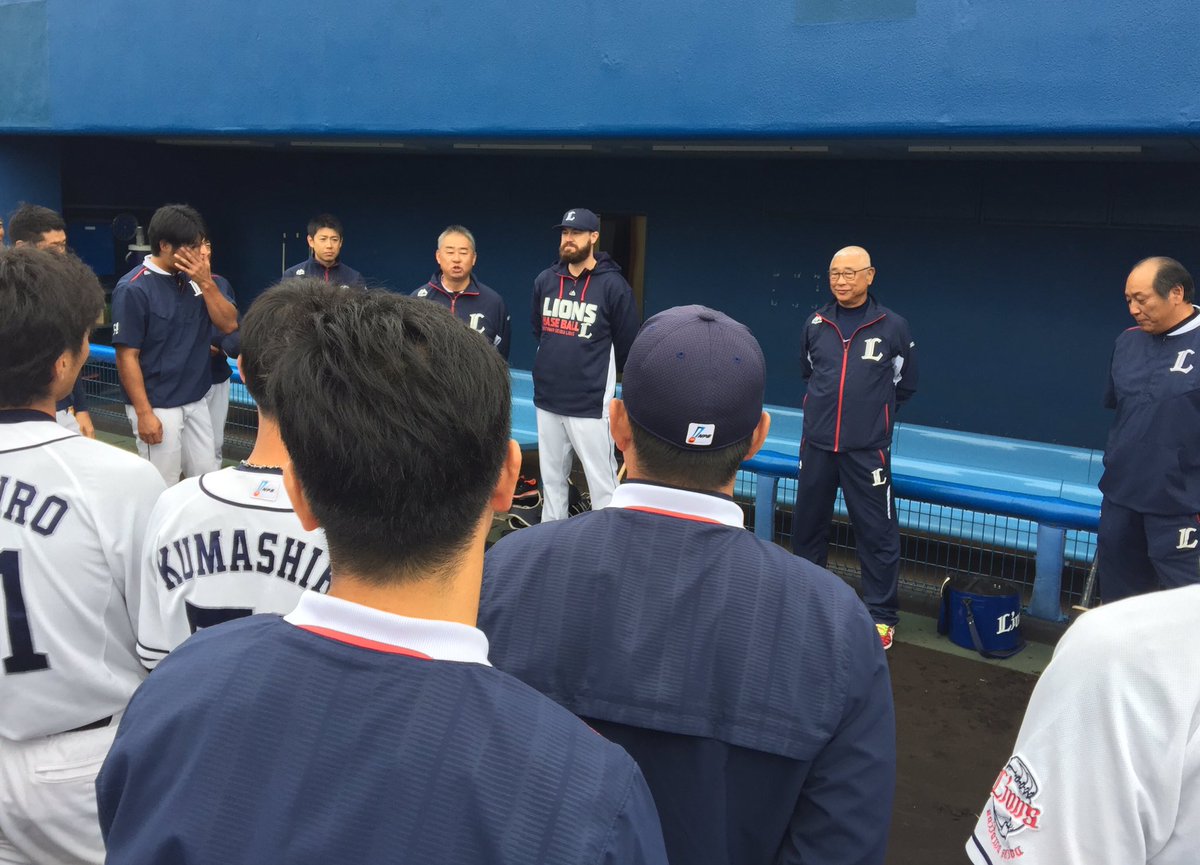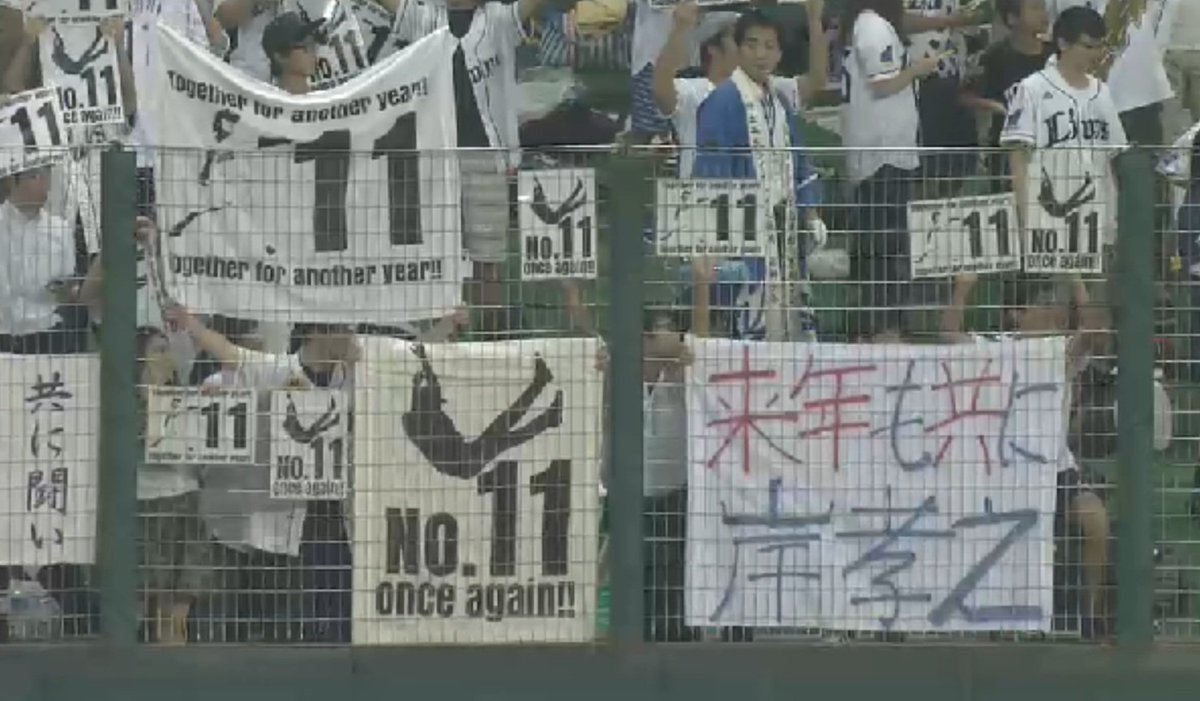The Saitama Seibu Lions had their ups and downs in 2016. This included hitting, pitching and defense with flaws at different points of the year.
Here, we will review the position players and give them a grade. For stats, we will post the slashline of Batting Average / On base Percentage / Slugging. FIP and pitchers will be examined later.
===
Catchers:
Ginjiro Sumitani: .218/.251/.269
"Gin-chan" had a rough season defensively besides at the plate. Of course he isn't known for his bat and will continue to be a hole. There was a point where he would come in as a defensive replacement in games during the second half of the season.
Grade: D
Masatoshi Okada: .227/.338/.227
Okada only saw 47 games as a backup catcher, which was more than last year, but still very minor. Norio Tanabe would use him as a defensive substitution if a pinch hitter took over Sumitani's spot in a given game. He would also be a pinch bunter on occasion.
Grade: D
C/OF Tomoya Mori: .292/.367/.436
Mori started the year without a position. He had a few games in right field, but was mostly seen as a pinch hitter until the Lions sent him down to ni-gun. Mori had less pop with less games, but wasn't bad when given a chance. In the second half of the year when the Lions were all but eliminated, he was getting more catcher reps and did well progressing with time. The Lions could no longer hide him as a designated hitter and were forced to put him in the field somewhere. If Mori can impress new manager Hatsuhiko Tsuji, he could get more catcher playing time.
Grade: B-
Tatsuyuki Uemoto: .305/.361/.386
Uemoto made the opening day roster and stayed on top for the year. He was the ultimate pinch hitter late in the game when needed and did a decent job of not getting out. While he wouldn't hit home runs, he could slap a single and keep the bases moving. With his flexibility at catcher, Tanabe was able to use him in the field if necessary as well.
Grade: B+
===
Infielders:
1B Ernesto Mejia: .252/.333/.509
Mejia had a much improved 2016 from a brutal 2015 season with a great first half. He started to fall off in the final two months and lacked power once the All-Star break concluded, however, it is a vast upgrade. He had a career high 35 home runs and was close to being the Pacific League's home run king. Unfortunately, Mejia only had 8 HRs total in the second half which was lacking. He would also see more time at DH than 2015.
Grade: B
2B Hideto Asamura: .309/.357/.510
Will the real Asamura step up? This was the best season Asamura had since 2013, which is arguably his peak season. He had 24 home runs at 40 doubles, even earning a monthly honor as the MVP for August in the Pacific League. He's shown that he can hit, but putting it together for a full season outside of 2013 had been an issue. After a slow April, he took off and was the best hitter for the 2nd half of the Lions season. Asamura's defense was also valuable at 2B.
Grade: A
3B/DH Takeya "Okawari-kun" Nakamura: .238/.313/.447
This was a brutal year for Okawari-kun. He would spent about a month in ni-gun after being ineffective and possibly not conditioned well. In the past, he has been known to be injury prone and this year showed it was no different. An argument can be made that he's the player who can make or break the Lions and the offense took a large hit when he was ineffective. One silver lining in all of this is that he played in 108 games for the season, making it the first time in his career he appeared in at least 100+ games for three consecutive years. He still had 21 home runs, but it wasn't the season he hoped for as the team tried making him a DH. It's unsure whether this will continue or not under Tsuji.
Grade: C-
SS/3B Yuji Onizaki: .253/.314/.332
Onizaki was the BABIP king and his average was rather higher than usual. He would get majority of the luck on balls put in play. Results offensively were there, but defensively, he had issues at both 3B and SS when in 2015 he showed that was his strength. With his defense bring a problem, he only played in 79 games.
Grade: C
SS/3B Shuta Tonosaki: .176/.222/.294
Tonosaki was supposed to be a more promising future shortstop after getting his feet wet in 2015. Like a lot of the team, his defense was an issue and he couldn't hit his own weight, making him mostly a pinch runner in 37 games. He was also ineffective on the base paths when given the chance. Tonosaki is still young, but there's competition behind him.
Grade: D-
UTIL Naoto Watanabe: .309/.352/.348
Watanabe was your utility infielder playing each position at least once. He is a decent spell player and was good in bunches where Tanabe clearly saw matchups on when to play him. I would argue Watanabe was the second best pinch hit option behind Uemoto and his defense was acceptable for 2016. Only problem for him was that he couldn't play every day.
Grade: B+
1B/SS/3B Shogo Kimura: .221/.262/.263
The Lions had an obsession with playing Kimura in the first half, giving him more time than Watanabe. He was versatile to play three positions on the infield, but was average at best. His bat wasn't reliable and Watanabe proved to be a better option comparing the two. In June, he would tear his ACL in practice and was brought back under an ikusei contact.
Grade: D-
SS/3B Kyohei Nagae: .162/.213/.176
Anyone who watches the Lions knows that Nagae's role is not about hitting. He's the best defensive infielder for the Lions and he proved that once again when playing SS or 3B. There was only one play that was a borderline error when he lost a flyball in the sun, but he was perfect at fielding ground balls and didn't cause problems while in the field. Tanabe continued to use him as a defensive substitute and whenever he started, there was an emphasis on defense.
Grade: B+
2B/3B Daichi Mizuguchi: .500/.500/.500
Mizuguchi saw 20 games and most of them were off the bench. A former ikusei pick, he would be a helpful pinch running option when with the ichi-gun. He would remain mostly buried with other infielders in front of him on the depth chart. Sample size is too small to really have a grade, but he didn't have a base running blunder like some.
Grade: Incomplete
SS/3B Nien Ting Wu: .194/.282/.234
Wu was the Lions 7th round pick in 2015 and he started playing ichi-gun games in the second half after a good season in ni-gun. For a shortstop, his defense was rather impressive and he wasn't a liability in the field. His bat can use some work, but he had a few "big hits" that Lions fans will remember and he even experienced what a hero interview was like. For a guy who was drafted in the late rounds, playing in 43 ichi-gun games (and starting most of them) is quite an accomplishment.
Grade: B-
Hotaka Yamakawa: .259/.335/.590
Yamakawa was a Spring Training star and it earned him a spot on the opening day roster. He was 0-11 and was sent down to ni-gun, where he hit 21 HRs. Yamakawa had an impressive second half, where had 14 HRs in only 49 games, including four in a three-game series against the Chiba Lotte Marines. Once he had the hang of playing at the ichi-gun level, he was fun to watch in a short time and he finished strong. Defense was acceptable, but not great.
Grade: B
===
Outfielders:
Shogo Akiyama: .296/.385/.422
If Akiyama didn't spent two weeks as the No.3 hitter in the lineup, he would've hit .300 easily. Coming off a historic record-breaking season, Akiyama was still solid at getting on base and providing hits as a leadoff hitter. He was also acceptable when hitting from the No. 2 spot. Surprisingly, he had more home runs (11) than Mori (10). Akiyama was the only Lions player to play in every inning for 2016.
Grade: A-
Takumi Kuriyama: .279/.390/.369
Kuriyama had a strong first half which carried him to his first All-Star game in 2016. He led the team in walks with 83 which explains his rather high on-base percentage. He traded spots with Akiyama for the leadoff spot and at one point was the team's hottest hitter. Defense was above average as he made a few impressive plays to save some runs.
Grade: B+
Yuji Kaneko: .265/.331/.311
Kaneko's defense was poor at SS through the first two months and Tanabe's solution was to put him in right field, where he appeared there the most. He would be a solid No. 9 hitter and even saw time as the leadoff hitter. Kaneko tied Yoshio Itoi for the NPB stolen base crown with 53 in total. If his defense didn't cost the Lions games in the first half, he did everything you want in a No. 9 hitter. It is unknown what the plans are as Tsuji takes the reigns.
Grade: B+
Shogo Saito: .000/.077/.000
Saito saw only 45 games at the ichi-gun level after being the 4th outfielder in 2015. He failed to get a hit and had some time as a pinch runner if not defensive replacement. Saito wasn't a problem in the outfield, but he had a few base running errors that hurt the Lions.
Grade: D-
Ryo Sakata: .245/.280/.371
Sakata won the RF job out of spring training and preseason. After doing well for three weeks, he fell back to earth but racked up quite a few important RBIs when with the ichi-gun. Sakata is likely to be good in bunches, but only for a designed matchup.
Grade: C
Fumikazu Kimura: .167/.219/.200
A former pitcher converted to position player, Kimura is a 5th outfielder at best. He only played in 28 ichi-gun games and most of them were as a late defensive replacement.
Grade: D
Masato Kumashiro: .167/.286/.167
Like F. Kimura, Kumashiro is a depth outfielder on the bench who is there in case of emergency. Kumashiro had better range than Kimura, but he also doesn't hit as well.
Grade: D+
Naotaka Takehara: .200/.226/.333
Takehara was viewed as another depth option when the Lions signed him. He was good for a few pinch hits and should've had a game winning base hit in one outing. However, his contributions were minimal as he only appeared in 22 games, with all of them in the first half.
Grade: F
Shotaro Tashiro: .250/.250/.250
Tashiro is mostly a pinch runner who is there as roster filler when an extended break is ahead. He appeared in only 13 games, but one of them is where he was remembered for being picked off by Shota Ono as he was supposed to be the game-tying run. This ruined momentum at the time, but the sample size isn't large enough for a grade.
Grade: Incomplete
Yutaro Osaki: .000/.167/.000
As a veteran, Osaki is usually called up if the Lions like a pitching matchup they see. However, he only appeared in four games for 2016 and failed to record a hit. Last year, we saw contributions but 2016 was a sign of regression.
Grade: Incomplete
===
Conclusion:
Some guys did well and others didn't. The 41-game stretch which was after the walkoff loss in Hiroshima (Uemoto blocking the plate) is what ruined the hitting. They went 10-31 including that loss and it took them too long to recover in order to compete for A-class. Asamura and Akiyama had good years, but it was disappointing as a whole when Okawari-kun couldn't stay on top while the team remained unclutch in those 41 games.
The defense was flawed, no question, but it only hurt them through April/May. It wasn't as brutal as the numbers and stats indicate. The only good news was how the Lions played their best baseball in August/September where we saw some fun games and the bats finally woke up. Defense was also improved at the time besides the pitching which is also a work in progress. In 2017, the Lions will need the Osaka Toin trio of Asamura, Okawari-kun and Mori to all have good or great seasons if they want to make A-class.
Tsuji will put an emphasis on defense, but at what cost? Will we see more bunting? Will there be less home runs as a result? Time will tell.
===
Follow us on Twitter @GraveyardBall




























